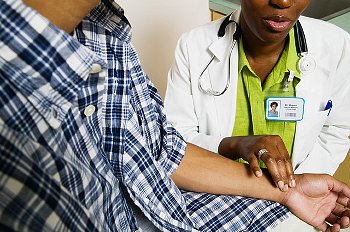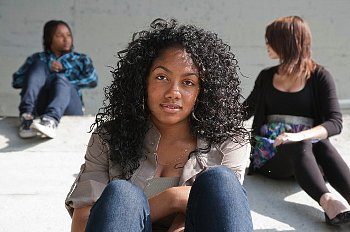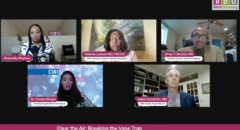 If you think your teenager is drinking or using drugs, the most important first step you should take is to directly ask them. According to research, when parents are direct and upfront about drug use, their children tend to have more self-control when it comes to illegal substances, and develop negative attitudes towards using them.
If you think your teenager is drinking or using drugs, the most important first step you should take is to directly ask them. According to research, when parents are direct and upfront about drug use, their children tend to have more self-control when it comes to illegal substances, and develop negative attitudes towards using them.
READ: Alcohol Use Before & After The 21st Birthday
Along with having an open conversation about drug use with your children, it's also important to be aware of the top signs and symptoms of drug use.
READ: How Dangerous Is Molly?
Knowing what to look for is a huge help in determining whether your child is drinking or using drugs – If you’re familiar with the signs of drug use, that knowledge can aid you in gathering evidence and starting the conversation. Here you'll find a comprehensive list of signs and symptoms of drug and alcohol use.
Keep in mind: Many of these signs of drug use or alcohol use – in isolation – may be just normal teen behavior. Mood swings or changes in behavior are a standard part of growing up as teens make the transition from childhood to adulthood. However, as you start to recognize more and more of signs and symptoms in your teen, a picture of drug or alcohol use may begin to become clear.
READ: Teen Drinking Today: Better Or Worse?

Health Changes
Drug and alcohol use can cause a number of effects on health, minor to major. If you notice any of the below symptoms, don't be afraid to suggest a visit to your teen's doctor. Often a doctor can offer a medical perspective or an outside viewpoint on what's happening to your teen.
-
- Frequent nosebleeds
- Runny nose, not caused by allergies or a cold
- Frequent sickness
- Sores, spots around mouth
- Queasy, nauseous
- Seizures
- Vomiting
- Wetting lips or excessive thirst (cotton mouth)
- Sudden or dramatic weight loss or gain
- Skin abrasions/bruises
- Accidents or injuries
- Depression
- Headaches
- Sweating

Behavioral Changes
The signs of substance abuse aren't all physical. Be aware of these behavioral indicators that may be a sign that your teen has been drinking or is using drugs, especially if you've noticed an abrupt change in one of these behaviors.
-
-
- Change in relationships with family members or friends
- Loss of inhibitions
- Mood changes or emotional instability
- Loud, obnoxious behavior
- Laughing at nothing
- Unusually clumsy, stumbling, lack of coordination, poor balance
- Sullen, withdrawn, depressed
- Unusually tired
- Silent, uncommunicative
- Hostile, angry, uncooperative
- Deceitful or secretive
- Makes endless excuses
- Decreased Motivation
- Lethargic
- Unable to speak intelligibly, slurred speech, or rapid-fire speech
- Inability to focus
- Hyperactive
- Unusually elated
- Periods of sleeplessness or high energy, followed by long periods of "catch up" sleep
-
Changes In Personal Appearance
Most drug and alcohol use may cause some change in physical appearance. Few of these in isolation are definitive proof of teenage alcohol use or drug use, but may fit into a larger pattern of symptoms, or act as a way to open up a conversation with your teen.
-
-
-
- Messy, careless appearance
- Poor hygiene
- Track marks on arms or legs (or long sleeves in warm weather to hide marks)
- Burns or soot on fingers or lips
- Red, flushed cheeks or face
-
-
Changes In Personal Habits
Look for changes in your teenager's behavior or personal habits that might indicate drug or alcohol use. If you notice any of the below, look for some of the other signs, or use them as a way to begin a talk with your teenager.
-
-
-
-
- Smell of smoke on breath or clothes
- Chewing gum or mints to cover up breath
- Heavy use of over-the-counter preparations to reduce eye reddening (eye drops), nasal irritation, or bad breath (breath mints or gum)
- Frequently breaks curfew
- Cash flow problems
- Reckless driving, car accidents, or unexplained dents in the car
- Avoiding eye contact
- Clenching teeth
- Locked bedroom doors
- Going out every night
- Secretive phone calls, texting, instant messages or emails
- "Munchies" or sudden, voracious appetite
- Sudden or increased use of air fresheners, scented candles, or incense
-
-
-

Changes At School Or At Work
Notice how your teenager is doing at school, any sudden change in how she or he is doing homework — or what you're hearing from teachers or school administrators.
-
-
-
-
-
- Truancy or loss of interest in schoolwork
- Drop in grades
- Loss of interest in extracurricular activities, hobbies or sports
- Failure to fulfill responsibilities at school or work
- Complaints from teachers or co–workers
- Reports of intoxication at school or work
-
-
-
-
Changes Inside Your Home Or Car
If you've noticed items disappearing around the house, or found some unusual objects appearing, it's a good time to have a talk with your teenager about what you've noticed, and to start looking for other signs of teenage alcohol abuse or drug use.
-
-
-
-
- Disappearance of prescription or over–the-counter pills
- Missing alcohol or cigarettes
- Disappearance of money or valuables
- Unusual smell in the car or bottles, pipes, or bongs on floor or in glove box
- Appearance of unusual containers or wrappers, or seeds left on surfaces, like Frisbees, used to clean marijuana
- Appearance of unusual containers or wrappers and drug apparatus, including pipes, rolling papers, small medicine bottles, eye drops, butane lighters or makeshift smoking devices, like bongs made out of toilet paper rolls and aluminum foil
- Hidden stashes of alcohol
-
-
-








